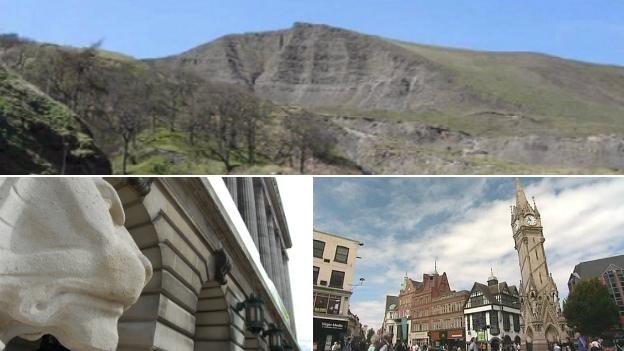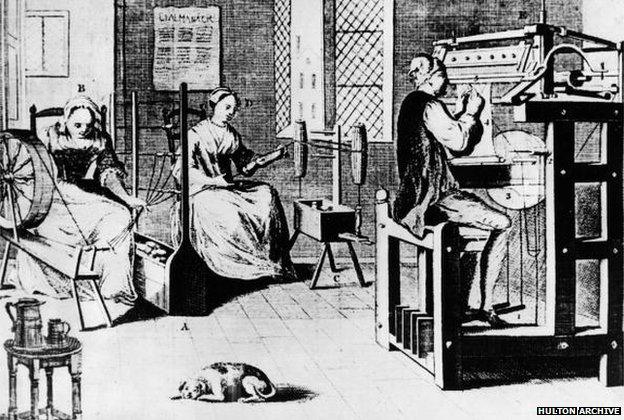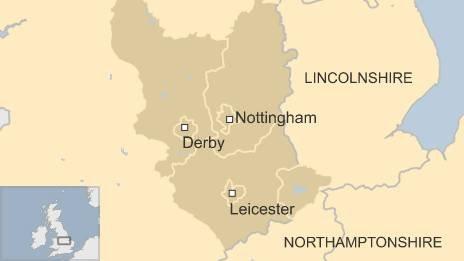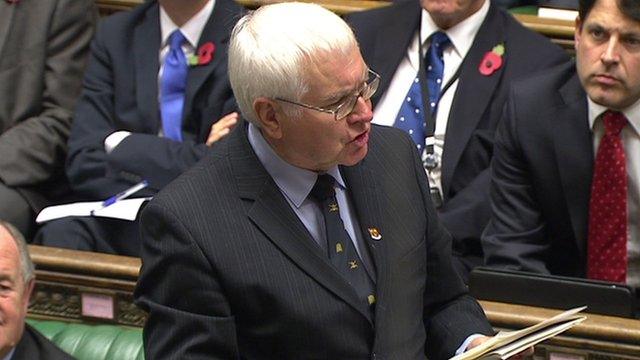Does the East Midlands have enough of a regional identity for devolution?
- Published

Kasabian and their use of Les-tah helps Leicester's sense of identity - but does the East Midlands have a regional identity?
Independence. A word which can inspire patriotic fervour, passionate debate and national pride.
Areas such as Northumberland, Cornwall or East Anglia have deep rooted regional identities making the case for devolution an obvious one. But as the devolution debate heats up, what of the East Midlands, a region largely drawn up by Whitehall mandarins? Is there enough of an identity to go it alone?
At a recent summit about HS2 in the East Midlands, former Pop Idol judge and rail enthusiast Pete Waterman, who chaired the conference, criticised the big councils, describing the region as "highly factionalised".
Last week, the councils were still bickering about the region's hub: Should it be built in Derbyshire or Nottinghamshire? Or, as some politicians in Leicestershire would prefer, should it be built at all?
But this competitiveness between the three counties is nothing new.

Each area has iconic landmarks: Mam Tor in Derbyshire, Nottingham's Council House and the Clock Tower in Leicester, but no one could represent the whole region
"In the 18th Century the knitting frames came to Leicester and Nottingham as manufacturers cut costs in London. Essentially, the cities were competing," said Prof Roey Sweet, from the University of Leicester's centre for urban studies.
"Leicester has always been a place with a lot of smaller, very wealthy businesses rather than the really powerful machinery and factory owners of the north west."
In the East Midlands, the raw materials needed for Victorian industry were sent from London and the goods returned to the capital to be sold. The three cities did not rely on each other and there were poor transport links.
Contrast that with the North West where Manchester operated as a hub, with materials passing through Liverpool and the satellite towns of Lancashire acting as specialist factories.
In both areas, this has left a historical hangover that lingers to this day.

When knitting machines came to the East Midlands it helped the cities become competitive
"What you have in Leicestershire and Nottinghamshire are smaller enterprises which have never exercised regional power," Prof Sweet said.
Research by the department suggests very few people moved between Derby, Leicester and Nottingham, although there were strong links between the cities and their counties.
It also showed that Leicester looked to London and the south while Derby was much more north and west facing - Nottingham sat somewhere between the two.
Work at Nottingham Trent University by linguist Dr Natalie Braber suggests that even today, residents have a similar outlook.
It also shows how difficult it is to pin down what the East Midlands is and who is from the region.
"We worked closely with sixth form students and always ask where the north south divide is. They never hesitate to draw a line," she said.
"But when we asked where they were from, only about 15% said East Midlands. Most left the question blank. Interestingly, adults were much happier to say East Midlands."

Vicky McClure, John Hurt and Gary Lineker are all from the East Midlands but do people think of the region when they see them?
Even so-called experts might struggle to define its boundaries. Lincolnshire poses a tricky question with the southern area similar to East Anglia while the northern part is more like Yorkshire. What about Northamptonshire? And let's not forget poor old Rutland which gets lumped with Leicestershire despite being an independent county.
As a linguist, Dr Braber's work surrounds accents and dialects, something she says is crucial to a sense of identity, particularly regional identity.
If you meet someone with a similar accent you immediately have something in common, but who can pinpoint a Nottingham or Leicester twang?
"The East Midlands is a really odd and interesting region," she said.
"There's something lacking in this region - not in a negative sense - that people can point out as East Midlands."
There is also a lack of cultural icons from the area to provide an easy shorthand and reference point for the region as a whole.
It could appear then, that there are too many differences between the three main counties in the East Midlands for them to work together.
.jpg)
Kasabian, who played the Pyramid Stage at Glastonbury 2014, included a track called eez-eh on their latest album 48:13
But Dr Braber has noted something happening to the accent in the last few years .
Say "Leicester" in Leicester and it often comes out as Les-tah. Properly would be properleh and happy, happeh.
At Kasabian's homecoming gig in the city's Victoria Park (Vickeh Park), Sergio Pizzorno had the word Les-tah emblazoned across his chest. One of the tracks on their latest album is called eez-eh (easy) - both nods to their roots.
It all might sound like an ingrained, long-standing feature of the Leicester twang. Not so.

The three big cities arguably dominate the region but the East Midlands technically includes Lincolnshire and Northamptonshire
"It's quite a new thing, only the last 10 years or so, but it's quickly become something that people identify with," Dr Braber said.
And it has crept over the border to Nottingham.
Is there a hope then, that this disparate area could work together and become a genuinely devolved region within the UK? Prof Sweet thinks that, perhaps, if real powers are handed down then maybe, just maybe, it would provide something for the people to unite behind.
"The East Midlands is entirely a top down imposition, an administrative convenience in order to carve up the country and very difficult to impose.
"It's a problem with this idea of regional devolution. Whilst there are some areas which clearly have a broader regional identity there are also a lot of ill defined regions for the sake of administrative efficiency.
"If a lot more regional powers are devolved then they might have a common experience - electing someone, spending money locally - that could create a sense of identity.
"How quickly and how successfully would depend on how much power is devolved."
- Published29 October 2014

- Published21 October 2014
- Published16 October 2014
